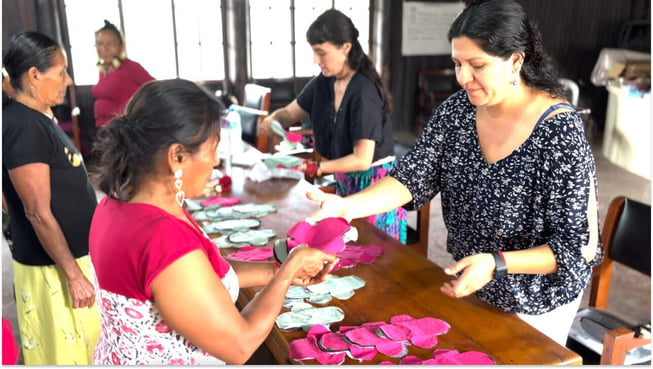How Indigenous Midwives are Transforming Childbirth in the Amazon
 In the remote Achuar and Shuar territories of Ecuador's Amazon rainforest, maternal and infant mortality rates remain high. Limited access to public healthcare exacerbates the issue, leaving Indigenous communities with few options for safe and culturally appropriate maternal care. To combat these challenges, Fundación Pachamama’s Ikiama Nukuri program is making a transformative impact through its maternal and infant health workshops. These workshops provide Indigenous women with essential midwife training that reinforces their traditional knowledge while integrating modern healthcare practices.
In the remote Achuar and Shuar territories of Ecuador's Amazon rainforest, maternal and infant mortality rates remain high. Limited access to public healthcare exacerbates the issue, leaving Indigenous communities with few options for safe and culturally appropriate maternal care. To combat these challenges, Fundación Pachamama’s Ikiama Nukuri program is making a transformative impact through its maternal and infant health workshops. These workshops provide Indigenous women with essential midwife training that reinforces their traditional knowledge while integrating modern healthcare practices.
Workshop Overview: Strengthening Skills and Knowledge
 From August 30th to September 7th, 2024, the Ikiama Nukuri program conducted a Level 2 maternal and infant health workshop in Taisha, located in the Morona Santiago Province of Ecuador. This workshop represents the second level of a three-level training process designed to equip Indigenous midwives, also known as community health promoters (CHPs), with the necessary skills to deliver safe and effective maternal care. By equipping CHPs with the knowledge and skills of safe prenatal, birthing, and postpartum care, the program is strengthening local capacity to address healthcare gaps in the Achuar and Shuar territories.
From August 30th to September 7th, 2024, the Ikiama Nukuri program conducted a Level 2 maternal and infant health workshop in Taisha, located in the Morona Santiago Province of Ecuador. This workshop represents the second level of a three-level training process designed to equip Indigenous midwives, also known as community health promoters (CHPs), with the necessary skills to deliver safe and effective maternal care. By equipping CHPs with the knowledge and skills of safe prenatal, birthing, and postpartum care, the program is strengthening local capacity to address healthcare gaps in the Achuar and Shuar territories.
Over the course of seven days, 18 workshop participants—who are all Indigenous midwives—engaged in a comprehensive curriculum designed to enhance both their nursing and midwifery skills. Each day built upon the previous one, allowing the midwives from local communities to develop a deep, practical understanding of maternal care.
Day 1: The workshop began with nursing skills reinforcement and an introduction to midwifery. Participants explored the role of midwives, discussing topics like puberty, sexual health, and violence prevention.
Day 2: Human reproduction took center stage, with participants learning about the menstrual cycle, pregnancy signs, and how to calculate due dates. Theoretical knowledge was paired with hands-on practice in conducting prenatal consultations.
Day 3: Sessions delved into the physiology of pregnancy and conception, as well as the warning signs of complications and how to address sexual violence—common yet critical topics in the region.
Day 4: The workshop focused on childbirth, teaching participants the ten rights of pregnant women, alternative pain management techniques, and the steps required for a safe, healthy birth.
Day 5: The midwives shared personal birth testimonies, learned about contraception and sexually transmitted diseases, and explored natural family planning methods, like the sympto-thermal method.
Day 6: Emphasis was placed on breastfeeding, a vital practice in promoting child health. The session highlighted the benefits of exclusive breastfeeding for the first six months of life.
Day 7: The workshop concluded with a community health fair, allowing participants to engage with the local community. A final theoretical and practical evaluation determined their readiness to advance to Level 3 of the program.
Bridging Traditional and Modern Medicine

What makes the Ikiama Nukuri program unique is its focus on bridging the gap between traditional birthing practices and modern healthcare techniques. For centuries, midwives in Achuar and Shuar communities have relied on ancestral knowledge to ensure safe deliveries. These workshops honor and preserve that knowledge while introducing the use of modern medical equipment like stethoscopes, thermometers, and blood pressure monitors—all of which were distributed during the workshop.
Additionally, the team provided 40 safe birthing kits to help midwives ensure clean and hygienic deliveries. These kits include baby clothes, soap, a candle, umbilical cord thread, rubbing alcohol, mother’s underwear, a blanket, and birthing pads—supplies that are crucial in an environment where access to hospitals is limited.
Why This Matters

This workshop is one of many steps toward achieving Ikiama Nukuri’s ambitious goal: ensuring that maternal and infant health services are available across 100% of Achuar and Shuar territories. By empowering Indigenous midwives with the tools, skills, and knowledge they need, the program is creating a ripple effect of improved health, leadership, and resilience. The impact extends beyond individual mothers and babies, and acts to strengthen the fabric of entire communities.
Midwives trained through Ikiama Nukuri play a crucial role as community leaders in maternal care. In regions where public healthcare access is scarce, these women provide essential services, ensuring that expectant mothers receive proper care and can give birth safely.
How to Get Involved
This month, we're hoping to welcome 75 new Global Citizens to our community to help end infant and maternal mortality in the Achuar and Shuar territories of the Ecuadorian Amazon. By becoming a Global Citizen, your monthly contribution of just $20 provides 4 birthing kits—helping to save 4 lives.
Become a Global Citizen today.